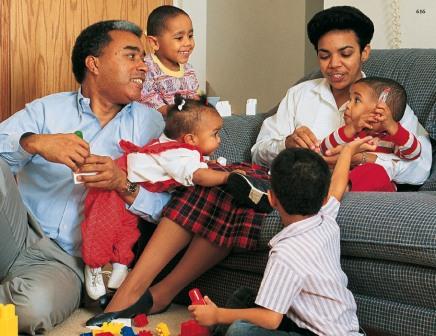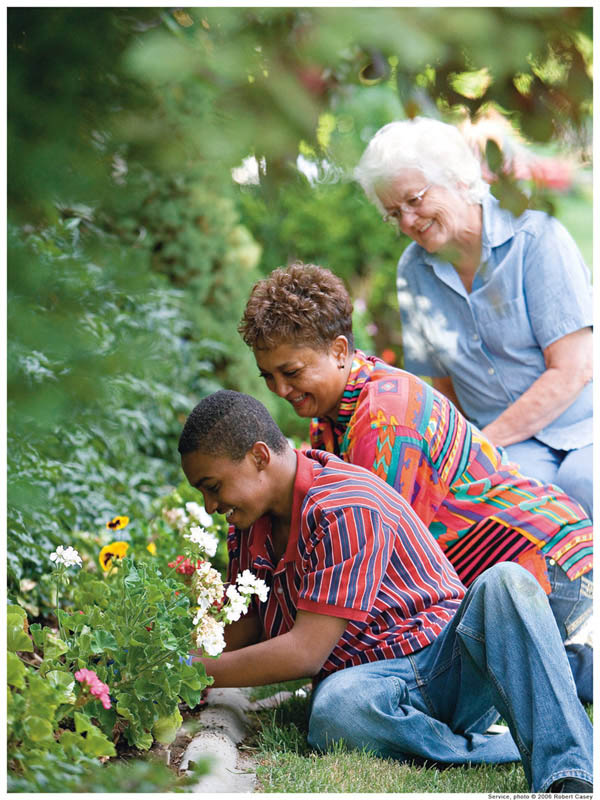Dieter F. Uchtdorf recently wrote of the influence women can have over their families and others. (Dieter F. Uchtdorf, “The Influence of Righteous Women,” Liahona, Sep 2009, 2–7) President Uchtdorf said:
As we look at the history of this earth and at the history of the restored Church of Jesus Christ, it becomes obvious that women hold a special place in our Father’s plan for the eternal happiness and well-being of His children.
I hope that my dear sisters throughout the world—grandmothers, mothers, aunts, and friends—never underestimate the power of their influence for good, especially in the lives of our precious children and youth!
 There are some who blame the Bible for the negative view of womanhood. However, it is the misunderstanding of the Bible that has led to this problem. God Himself clearly honors women and their roles in life and women are frequently shown filling essential roles and demonstrating great faith. While some in the world portray Eve as a weak and disobedient woman who brought all this on, Mormons hold her in high esteem as a role model. Mormon beliefs teach that Eve understood that she could not fulfill her God-given assignment to become a mother until she left the garden, and so, after careful thought (because the Bible doesn’t say she decided immediately) chose to make the great sacrifice necessary to allow us to be born. Because Mormon beliefs teach that we lived before our births with God, we would be there even today had she been selfish and chosen a life of ease and pleasure.
There are some who blame the Bible for the negative view of womanhood. However, it is the misunderstanding of the Bible that has led to this problem. God Himself clearly honors women and their roles in life and women are frequently shown filling essential roles and demonstrating great faith. While some in the world portray Eve as a weak and disobedient woman who brought all this on, Mormons hold her in high esteem as a role model. Mormon beliefs teach that Eve understood that she could not fulfill her God-given assignment to become a mother until she left the garden, and so, after careful thought (because the Bible doesn’t say she decided immediately) chose to make the great sacrifice necessary to allow us to be born. Because Mormon beliefs teach that we lived before our births with God, we would be there even today had she been selfish and chosen a life of ease and pleasure.
This simple explanation of the events of the Garden, so different from what most religions teach, set the stage for the Mormon view of women as capable of great spiritual understanding and choices. Just as Eve worked hard to set the proper example for her children, and just as Mary worked hard at raising the Savior during his earthly life, women around the world are working to fulfill their God-given roles as wives, mothers, leaders, and examples.
Women have many opportunities to be an influence for good. As wives and mothers, they often set the tone for the home. They are in a position to create a spiritual environment and to guide their families to a proper set of priorities, since they often decorate the home and organize the schedules. They are able to fill their homes with constant reminders of their family’s faith and select activities that put those beliefs into action. Their own example can be powerful. President Uchtdorf said:
There is a saying that big gates move on small hinges. Sisters, your example in seemingly small things will make a big difference in the lives of our young people. The way you dress and groom yourselves, the way you talk, the way you pray, the way you testify, the way you live every day will make the difference. This includes which TV shows you watch, which music you prefer, and how you use the Internet.”
He went on to say these choices will demonstrate to our families and others who watch us what our priorities are and what we consider important. This example will matter more than the lectures we deliver or the formal lessons we teach.
Within the communities, women are often in a better position to influence decisions. Those whose children are older often find themselves with time for volunteer work, which broadens their sphere of influence. In this work, they can fulfill the special mission of women to care for those in need, work to protect righteousness in their communities, and reach out to more people. Many women select careers that allow them to serve others as well.
President Uchtdorf pointed out that women are builders of nations, because “strong homes of love and peace will bring security to any nation. I hope you understand that, and I hope the men of the Church understand it too.” Mormon leaders have often pointed out that the strength of a nation is dependent on the strength of the families in that nation. Families train the future leaders and set the moral tone of the nation. Because mothers have the primary responsibility for the raising of children, it is largely their influence that influences the nation. Those who have no children fill of the roles of motherhood by serving children, families, and others in whatever role they choose for themselves.
When the home is strong, the nation has a solid foundation on which to build, and this gives women an unappreciated power. It may not be a role that puts them into the history books by name, but no one can measure their influence on the well-being of their homelands.
To improve their ability to influence the world and their homes, and to prepare for a career should it be needed, Mormon women are taught to get an education and training and to use this in both their professional and personal lives. As Mormon women decide where, beyond their own home, they most want to influence the world, their education can make them more effective. They are taught to obtain a formal education, but also to continue a course of life-long self-directed study of both spiritual and secular topics.
The Thirteenth Article of Faith (one of thirteen statements of belief written by Joseph Smith) gives women a pattern for their wise use of their time and their power. It can serve as a guide for deciding what method to use when changing the world.
We believe in being honest, true, chaste, benevolent, virtuous, and in doing good to all men; indeed, we may say that we follow the admonition of Paul—We believe all things, we hope all things, we have endured many things, and hope to be able to endure all things. If there is anything virtuous, lovely, or of good report or praiseworthy, we seek after these things. (Articles of Faith)
About Terrie Lynn Bittner
The late Terrie Lynn Bittner—beloved wife, mother, grandmother, and friend—was the author of two homeschooling books and numerous articles, including several that appeared in Latter-day Saint magazines. She became a member of the Church at the age of 17 and began sharing her faith online in 1992.






